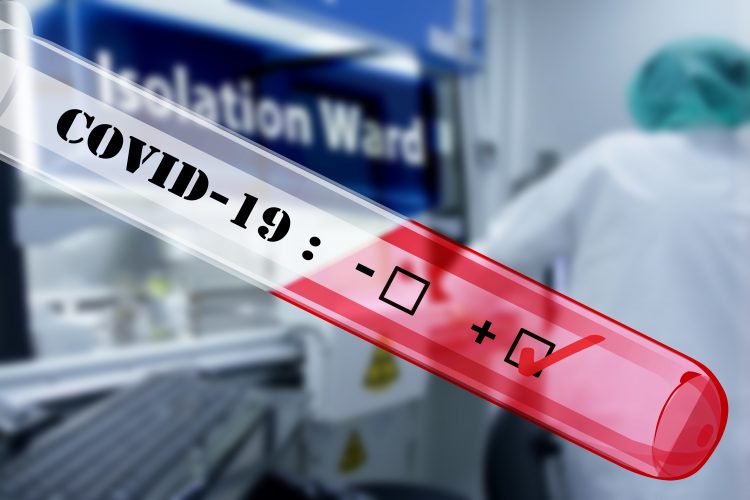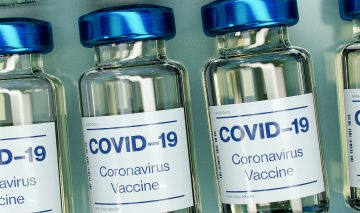As cases decline, Covid-19 test centres in Kathmandu are desolate lot
South Asia Check / December 28, 2022
The laboratories that cannot establish relationships with manpower agencies have little work related to PCR tests.
On a Tuesday afternoon in mid-December, the billing and sample collection chambers at the Central Diagnostic Laboratory at Kamalpokhari in Kathmandu bore an eerie silence. For much of the 90 minutes that a South Asia Check reporter spent in and around the lab, hardly anyone came in to get a Covid-19 polymerase chain reaction test done.
A year ago, silence would have been the last word to explain the scene in the laboratory. It would buzz with all kinds of customers–patients and travellers alike–waiting to get their Covid-19 tests done as the number of patients spiked. It handled around 2,000 Covid-19 tests a day in the thick of the pandemic, as per a laboratory staff member. But now, as Covid-19 infection comes down to a single digit per day, all the laboratories get is the travellers getting mandatory tests done.

On December 27, for instance, only 527 PCR tests were reported across the country. Only eight new cases were updated through PCR on that day, with the number of active cases being just sixteen. A December 12 data from the National Public Health Laboratory shows only 6 Covid-19 tests were performed in the laboratory in 24 hours.
As the number of patients decreases, laboratories now depend on their business relationships with manpower agencies for work. The customers getting their Covid-19 tests done for foreign travel visit the laboratories with which their manpower companies have a business relationship. The labs that cannot establish such relationships get little to no work.
Samikshya Diyali, an executive in the PCR report section of the Star Hospital in Lalitpur, told South Asia Check they receive around 25 patients per day, most of the customers being those who need a PCR test to fly abroad.
Similarly, Lok Bandhu Chaudhary, Information Officer at the National Public Health Laboratory, said only a few people were showing up for the Covid-19 PCR tests, most of whom are travellers.
Even as the decline in cases comes as positive news, laboratories that set up equipment for Covid-19 PCR tests are left to wonder what happens to their equipment and employees.
The decline in PCR tests has affected the workflow of the laboratories, which have had to lay off their staff. “Since sample collection is low these days, we have reduced our workforce from 108 to 68 individuals,” said Kamalesh Yadav, laboratory in-charge of Central Diagnostic Laboratory.
An executive at another Kathmandu-based laboratory said it is shifting its focus back to molecular lab technology after the Covid-19 rush. This, though, has affected the earnings of the laboratories. “Surviving just on research is not an option here in Nepal. Laboratories are earning virtually nothing and are forced to reduce their manpower or leave their machines unused,” the executive, who wished to remain anonymous, told South Asia Check.
With the global decline in the number of Covid-19 cases, except for a few countries like China and Japan that have reported significant spikes recently, scientists are wondering if Covid-19 as a “pandemic” is over. For Dr. Sher Bahadur Pun, Chief of the Clinical Research Unit at the Sukraraj Tropical and Infectious Disease Hospital in Kathmandu, it is time to reconsider Covid-19 as a pandemic. “The strength of SAR-COV-2 had weakened in the post-vaccination era”, Dr. Pun wrote in a recent opinion piece in the December 20 edition of The Kathmandu Post.
Meanwhile, the government is concerned over increased Covid-19 cases due to new variants in neighboring countries. On December 24, the Ministry of Health and Population reiterated that the risk of Covid-19 is still there and urged people to follow health precautions and get jabbed.
This material is copyrighted but may be used for any purpose by giving due credit to southasiacheck.org.
Comments
Latest Stories
- In Public Interest Covid-19 cases are low, but that’s not an excuse to avoid vaccination
- In Public Interest What is BF.7, the sub-variant that has the world by its grip?
- In Public Interest Threat of a new Covid-19 wave looms large amid vaccine shortage in Nepal
- In Public Interest As cases decline, Covid-19 test centres in Kathmandu are desolate lot
- In Public Interest Dengue test fee disparity has patients wondering if they’re being cheated
- In Public Interest As dengue rages on, confusion galore about what it is and what its symptoms are. Here’s what you need to know
In Public Interest
 Covid-19 cases are low, but that’s not an excuse to avoid vaccination
The Pfizer-BioNTech bivalent vaccines authorised by the Nepal Government provide better protection a...
Read More
Covid-19 cases are low, but that’s not an excuse to avoid vaccination
The Pfizer-BioNTech bivalent vaccines authorised by the Nepal Government provide better protection a...
Read More
- What is BF.7, the sub-variant that has the world by its grip?
- Threat of a new Covid-19 wave looms large amid vaccine shortage in Nepal
- As cases decline, Covid-19 test centres in Kathmandu are desolate lot
- Dengue test fee disparity has patients wondering if they’re being cheated
- As dengue rages on, confusion galore about what it is and what its symptoms are. Here’s what you need to know